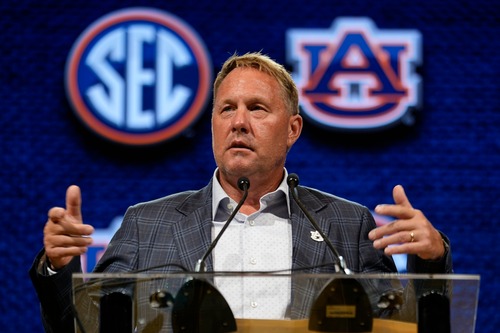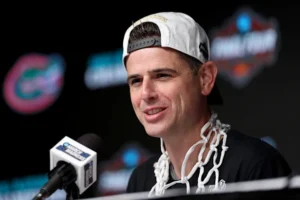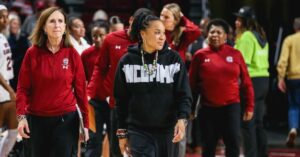
Hugh Freeze and Auburn Football: A Reflection on the Challenges of Building a Winning Program
When Auburn University hired Hugh Freeze as its new head football coach in 2022, there was a palpable sense of optimism surrounding the hire. Auburn, a program rich in tradition with a storied history of success, was looking for a coach who could revitalize the team, bring them back to SEC prominence, and restore their competitive edge. Freeze, who had previously enjoyed success at Ole Miss and Liberty, seemed like an ideal candidate to do just that. However, after two seasons at the helm, Freeze’s tenure at Auburn has faced significant challenges, culminating in a 11-17 record that is far from what the Auburn faithful had hoped for.
Despite Freeze’s experience, reputation, and previous successes, it has become clear that his original plan for Auburn football needs reevaluation. What started as a promising beginning has now forced Freeze to reconsider his approach. In this article, we will explore the obstacles Freeze has encountered, the decisions he has made, and how his tenure at Auburn has unfolded—ultimately examining the possibility of change and recalibration moving forward.
The Optimism of Hugh Freeze’s Arrival at Auburn
Hugh Freeze’s hiring at Auburn was greeted with great anticipation. The program had been in turmoil, with a revolving door of head coaches and inconsistent results on the field. Auburn had experienced success in the past, with the 2010 national championship and several competitive seasons, but in recent years, the program had failed to live up to its potential. The hiring of Freeze was seen as a bold move to finally get the Tigers back on track.
Freeze had built a reputation as a dynamic offensive mind. His time at Ole Miss saw him lead some of the most potent offenses in the SEC, and his stint at Liberty had shown that he could rebuild and develop a program from the ground up. His ability to recruit, coupled with his offensive acumen, made him an attractive candidate to revive Auburn’s fortunes.
At the time of his hiring, many Auburn fans believed that Freeze’s fast-paced offense and ability to develop quarterbacks would be the key to returning the program to national relevance. With the SEC’s demanding schedule and talent-laden teams, Auburn needed a coach who could bring innovation and stability to the program, and Hugh Freeze seemed like the right man for the job.
The Early Struggles: Challenges on and off the Field
However, the first two years of Hugh Freeze’s tenure at Auburn have been far from easy. Despite a strong recruiting class in his first year, the team’s performance has been disappointing. The Tigers finished the 2023 season with a 5-7 record, continuing the trend of mediocrity that had plagued Auburn under previous coaches. The 2024 season started with more uncertainty, and the struggles continued as Freeze and his team faced a daunting SEC schedule.
While it’s important to recognize that building a competitive football team in the SEC is no small task, Freeze has faced specific challenges that have hindered his success. Let’s take a closer look at these obstacles:
1. Quarterback Play
One of the most glaring issues for Auburn under Freeze has been the inconsistency at quarterback. Quarterback play is often the most critical factor in a team’s success, and Auburn has struggled to find stability at the position. In Freeze’s first season, the Tigers cycled through multiple quarterbacks, none of whom were able to seize the starting job and make a lasting impact.
In 2023, the quarterback situation did not improve. The lack of a reliable signal-caller on offense made it difficult for Auburn to establish any offensive rhythm. Freeze’s system requires a quarterback who can read defenses, make quick decisions, and execute the offense efficiently. Unfortunately, Auburn did not have the right player to lead the offense in Freeze’s first two years, and this lack of consistency under center contributed to the team’s struggles.
2. Recruiting Challenges
Another factor that has hindered Freeze’s success at Auburn is the challenges in recruiting, particularly in a highly competitive SEC environment. While Auburn has always been a top-tier program in terms of talent, Freeze has faced difficulties in building a roster that is deep enough to compete consistently with the elite teams in the conference.
Recruiting in the SEC is highly competitive, with schools like Alabama, Georgia, LSU, and Tennessee regularly securing top-tier talent. Freeze has had to contend with these powerhouse programs while trying to build a program that can compete at the highest level. Additionally, the NIL (Name, Image, and Likeness) landscape has added another layer of complexity to the recruiting process. Auburn has not yet found a way to consistently match the NIL offerings of its rivals, which has made it harder for Freeze to land elite prospects.
The challenges in recruiting have been exacerbated by the transfer portal. Freeze’s ability to attract top talent through the portal has been inconsistent, and while Auburn has brought in some key players, they have yet to build the type of depth and talent necessary to compete for championships in the SEC. The program’s struggles in this area have made it more difficult for Freeze to implement his vision and build a competitive team.
3. The SEC Gauntlet
The SEC is widely regarded as the toughest conference in college football, and for good reason. The level of competition is fierce, and even the most successful programs face challenges in every game. Auburn’s schedule is consistently loaded with tough opponents, and the team’s struggles in SEC play have been evident. The Tigers have had difficulty keeping pace with the elite teams in the conference, which has resulted in multiple lopsided losses.
Freeze’s system relies on offensive efficiency and explosive plays, but in the SEC, even the best offensive systems can struggle against the conference’s elite defenses. Auburn has found itself outmatched in several key games, and the lack of a strong defense has only exacerbated the team’s issues. The Tigers have struggled to maintain consistency on both sides of the ball, which has prevented them from being competitive in the SEC.
A Shift in Strategy: Rethinking the Plan
After two seasons of disappointing results, Hugh Freeze has begun to reassess his approach to building Auburn football. The initial plan, which focused on establishing an up-tempo, high-scoring offense, has not yielded the results Freeze had hoped for. While his offensive system is designed to exploit mismatches and create big plays, Auburn’s lack of consistent quarterback play, combined with defensive deficiencies, has made it difficult to implement that system successfully.
As a result, Freeze is shifting his focus. While maintaining his offensive philosophy, he is recognizing the need for balance. He has begun to place a greater emphasis on building a stronger defense, something that will be critical for competing in the SEC. In addition, Freeze has begun to take a more methodical approach to recruiting, recognizing that Auburn’s success will depend on building depth across all positions, not just focusing on offensive skill players.
Freeze has also made efforts to improve the development of his quarterbacks. Recognizing that the quarterback position is the key to any offense, he has worked tirelessly to identify the right quarterback for his system and has focused on developing young talent. Freeze’s ability to recruit and develop a quarterback who can execute his offense will be pivotal in determining the future success of the program.
Looking Ahead: What Does the Future Hold for Hugh Freeze and Auburn?
As Hugh Freeze enters his third season at Auburn, there is a sense of urgency surrounding the program. The initial optimism surrounding his hire has waned, and the pressure is mounting for him to show progress on the field. With a disappointing 11-17 record over his first two seasons, Freeze knows that he must turn things around quickly if he is to avoid becoming the next in a long line of failed Auburn coaches.
The road ahead will not be easy. The SEC is as tough as ever, and Auburn faces a challenging schedule each year. However, there are reasons to be optimistic. Freeze has proven himself to be a capable coach in the past, and with a clear focus on improving Auburn’s depth, defense, and quarterback play, he may be able to turn the program around.
Ultimately, Hugh Freeze’s tenure at Auburn will be defined by his ability to adapt and evolve. The challenges he has faced in his first two seasons are significant, but they are not insurmountable. Auburn’s rich football tradition and passionate fanbase provide a strong foundation for future success, and if Freeze can find the right formula, he may yet fulfill the promise that came with his hiring.
In the end, Auburn football is a long-term project. While the road has been rocky so far, Hugh Freeze has the opportunity to build something sustainable and successful. With the right adjustments, time, and support, Freeze’s vision for Auburn could still come to fruition. However, the clock is ticking, and the pressure is on to deliver results—because, in the SEC, mediocrity is not an option.





